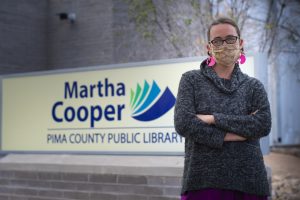This article, by Sarah Tarver-Wahlquist, was originally published in the Arizona Daily Star on April 25, 2021.
Three years ago, the world looked different, and so did my life. I’d been living back in Tucson for 10 years, most of my time spent as a stay-at-home-parent for my three kids, with a steady stream of freelance writing and community organizing on the side. I was just starting to look ahead at the question that comes up for many people my age: What is next?
The answer came to me one bright Wednesday morning in the Children’s Room at the Joel D. Valdez Main Library. We’d come for our beloved Storytime with Caitlin, and I was watching customers mull around the stacks. There’s so much to love about the library—more books than you could read in a lifetime, friendly staff ready to help, walls covered in art celebrating our community, and much more. One of my favorite things has always been watching other people in the library and seeing how they use the space. For some people, the library is a cool place to read the paper on a scorching summer’s day. For others, it's somewhere to use a computer to search for job resources while their children play safely nearby. For my kids, it’s been a source of education, entertainment, and community.
For me, the library has always been a sanctuary and fount of joy. Which is why, that Wednesday morning, after months of “What’s next?” swirling in my head, the puzzle pieces finally fell into place—I should work here.
I turned to librarian friends for advice, and six months later, I was enrolled in Graduate School at the University of Arizona, pursuing a Master’s in Library and Information Science. I’ve had the great honor of participating in the University’s nationally-recognized Knowledge River Program, which prepares future librarians to better serve BIPOC (Black, Indigenous, and people of color) communities, and I’m constantly amazed by the thoughtful, compassionate, and truly radical work of my colleagues and instructors.
The most exciting part by far has been serving as a Graduate Assistant with the Pima County Public Library. I had to pinch myself my first day on the (remote) job—I’d gone from being the ultimate library fangirl to having a role within the library itself! Even though the pandemic has prevented me from being able to work in a branch, I’ve still been able to dig into library work on many levels.
As a member of the Welcome to America team, which focuses on how the Library can best serve immigrants and refugees, I'm currently part of an exciting collaboration with Arizona Public Media. Together, we are creating a new series of programs to highlight humanities contributions of immigrants in our community. Our first Global Arts spotlight aired online in March, and our upcoming even in May will feature music and dance in honor of Asian American and Pacific Islander Heritage Month. Being part of this project from conception through completion introduced me to more people throughout the library system and showed me some of the magic behind the programming that I’ve long loved and appreciated as a patron.
I’ve also had the honor of watching my colleagues work with grace and patience through a very challenging time, demonstrating their commitment to continually reinventing what it means to work at a library in a time of community crisis.
We’re all starting to see some glimmering at the end of the tunnel. While we don’t know when our libraries will be back to “normal” with Storytimes, citizenship classes, community gatherings, and more, the return of limited browsing in our libraries means something very exciting for me. This month I’ll be working my first shift at the Martha Cooper Library, where I hope to finally fulfill one step in my dream of becoming a librarian—checking out a book to an eager reader. Maybe it will be you!
Sarah Tarver-Wahlquist is a library fangirl thrilled to be working as a Graduate Assistant for the Pima County Public Library while working toward her Master's degree in Library and Information Science at the University of Arizona, where she is a Knowledge River Scholar.


